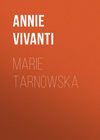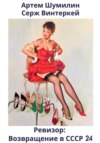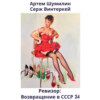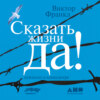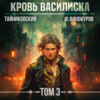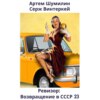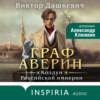Читать книгу: «Marie Tarnowska», страница 9
XXVII
It was only a saucy little page-boy in red uniform.
“If you please, Count Kamarowsky sends word that he is waiting for you.”
“Say that I shall be down directly.”
“No,” contradicted Prilukoff; “send word that you are not going down.”
“But then he will come here.”
“You will say that you cannot receive him.”
And that was what took place. And not on that evening only. Prilukoff installed himself, during long days and evenings, in my apartments, and refused to go away. Very often he did not even allow me to go out of the room.
Then came Count Kamarowsky knocking at the door.
“No! no! You cannot come in!” cried Elise Perrier, pale and trembling, leaning against the locked door.
“But why? Why? What has happened?”
“Nothing has happened. Madame is not feeling well,” Elise would reply, in quavering tones.
“But that is all the more reason why I should see her,” protested the Count. “I must see her!”
“It is impossible!” And Elise, whom fear rendered well-nigh voiceless, would roll towards me her round, despairing eyes.
Then the Count would speak to me through the closed door, entreating and arguing; and every time he used a tender expression Prilukoff, who held me fast, pinched my arm.
“Mura, Mura, let me in. Let me see you for a moment. You know how I love you (pinch); it is cruel to lock me out as if I were a stranger. If you are ill let me take care of you, with all my tenderness (pinch), with all my love (pinch)—”
In feeble accents I would reply: “Forgive me—I shall soon be better—do not trouble about me.”
“But what is the matter? Why do you not want to see me? Do you not love me any more?”
“Oh, yes, I love—(pinch). Please, please go away. I shall come down as soon as I can.”
Then I could hear his slowly retreating footsteps, while Prilukoff glared at me and, on general principles, pinched my arm again.
It was with the greatest difficulty that I could conceal Prilukoff's presence from little Tioka.
One day the child caught sight of him seated on the terrace, and, with a wild cry of delight, started to run towards him. I caught him in my arms. “No, darling, no! That is not Prilukoff. It is some one very much like him; but it is not our friend.”
And as the man, with scowling countenance, was gazing out at the sea, and paid no heed to us, Tioka believed me, and, with a little sigh of regret, ran in search of his playmate Grania.
The life Prilukoff led me in this grotesque and unbearable situation is impossible to describe. My days were passed in an agony of terror. When I dined with Kamarowsky, Prilukoff invariably took a seat at the next table, and I might almost say that it was he who regulated our conversation. If any subject were raised that was distasteful to him—my approaching marriage to Kamarowsky, for instance, or some tender reminiscence which my betrothed loved to recall—Prilukoff, at the adjoining table, made savage gestures which terrified me and attracted the attention of all the other guests. He would shake his fists at me, glare at me with terrible eyes, and, if I pretended not to notice him, he upset the cruet-stand or dropped his knife and fork noisily to attract my attention. He would stare at the unconscious, slightly bald head of Kamarowsky, and imitate his gestures with a demoniacal grin.
The guests of the hotel thought him insane, and he certainly behaved as if he were. I myself have often thought: “Surely he is a madman!” when I came upon him suddenly, hidden behind the curtains in my sitting-room, or crouching in a dark corner, or lying on my bed smoking cigarettes. I felt that my nerves and my reason were giving way.
“What do you want of me, you cruel man?” I sobbed. “What am I to do? Do you wish me to tell everything to Kamarowsky? To break off the marriage and return to Moscow with you?”
“We cannot return to Moscow, and you know it,” growled Prilukoff.
“Somewhere else, then. Anywhere! I will go wherever you like, I will do whatever you like. Anything, anything, rather than endure this torture any longer.”
“For the present we stay here,” declared Prilukoff, who seemed to enjoy my anguish. “And as for the future,” he added, rolling his terrible eyes, “you can leave that to me.”
Sometimes he forbade me to go out with Kamarowsky. At other times he followed us in the streets, torturing me behind the unconscious back of my betrothed, who marveled and grieved at my extraordinary and frequently absurd behavior.
Early one morning, as I looked out of my window, I saw Kamarowsky standing on the terrace, gazing thoughtfully out at the sea. I ran down to him. We were alone. “Paul,” I whispered hurriedly, “let us go away from here; let us leave quietly, to-day, without saying a word to any one.”
He laughed. “What a romantic idea! Do you not like this place? Are you not happy here?”
“No, Paul, no! There is some one spying upon me.”
“Spying upon you?” he repeated, greatly astonished. “Is that the reason of your strange behavior?”
“Yes, yes, but do not ask me any more questions.”
“Who is it? I must know who it is.”
“No, Paul. I will tell you later on. Hush!”
“You are a fanciful creature,” he said, laughing and patting my cheek.
I felt hurt at his calm acceptance of what I had told him, and wondered that he did not insist upon knowing more. I reflected in my folly that if he really loved me he ought to have been less satisfied and secure. I did not understand—alas! I never understood—his guileless and noble trust in me. The insensate and exacting passion of others who until now had dominated my life had spoiled me for all normal affection. Hypersensitive and overwrought, I myself suffered unless I caused suffering to those I loved; nor did I ever feel sure of their love unless they doubted mine.
The love that varies not from day to day,
A tranquil love, unruffled and serene—
was not the love I knew. My storm-tossed heart did not recognize it. Neither on that day nor ever could I bring myself to believe that Paul Kamarowsky really loved me.
During those few moments that we were alone together on the terrace, we arranged that I should start with Tioka and Elise that very evening, during the dinner hour, leaving all our trunks behind us for my betrothed to see to after we had left. He could join us three days later in Vienna, and then we should all proceed to Orel, where important affairs claimed his presence.
Half-way through dinner, as had been arranged (and as usual Prilukoff sat at a table next to ours), Elise entered the dining-room timidly and came to our table.
“I beg your ladyship's pardon. Master Tioka is outside and wishes to say good-night.”
“Bring Master Tioka in,” I said, trying to speak naturally and raising my voice a little so that Prilukoff should hear.
“I am sorry, my lady, but he refuses to come,” and Elise hung her head as she spoke these words; the treason we were perpetrating on Lohengrin grieved her even more than the tortures that Lohengrin had inflicted upon me.
“Pray excuse me a moment,” I said to Count Kamarowsky, and rose from the table. “I shall be back at once.”
No sooner was I outside the dining-room than Elise threw my traveling cloak round me. A motor-car was throbbing at the door, and in it with beaming face sat Tioka surrounded by our hand-bags and dressing-cases, shawls and hats.
“What are we doing?” he cried gleefully. “Are we running away?”
“Yes, darling,” and I clasped him to my heart, as I sank into the seat beside him. The motor was already gliding through the twilight roads towards Cannes.
“But why? Why are we running away? Have we stolen something?”
At those words my heart stopped beating. I suddenly remembered Prilukoff's ill-gotten banknotes.
“Elise!” I gasped; “in the desk in my sitting-room—there was some money.”
“Yes, madame.”
“What did you do with it?”
“It is quite safe, madame. I have taken it.”
“You have taken it!”
“Yes, madame. Here it is.” And with satisfied hand Elise patted a black leather satchel that lay in her lap.
With a sob I hid my face in my hands.
Indeed, we had stolen something!
XXVIII
As soon as we reached the frontier I telegraphed to Prilukoff. I wanted to send Elise back to Hyères with the money, but she refused to leave me.
“What if Mr. Prilukoff were to kill me,” she cried. “Then what would your ladyship and poor little Master Tioka do, all alone in the world?”
“But my good Elise, why on earth should Mr. Prilukoff kill you?”
“I don't know,” sighed Elise. “But he has become so strange of late—” and after a pause, she added, under her breath: “We have all become very strange.”
It was true. I could not but admit it. We were “very strange.” We were not at all like other people. The people that we met on our journeys and in hotels, for instance, all took an interest in external things—in the surrounding landscape, or in works of art and monuments and cathedrals. As for us, we never spoke about monuments. We never entered a cathedral. We took no interest whatever in anything beyond our own dolorous souls. We were even as those who travel with an invalid, watching him only, caring for and thinking of nothing else. The invalid I traveled with was my own sick soul.
The least peculiar among us was Count Kamarowsky. Yet even he, I fancy, was not quite like other people. His was not a strong nature, like that of some men I had known. Perhaps the Slav blood is responsible for much that is abnormal and unconventional. Surely we are from the inmost depths of our nature strangely removed from the Teutonic, the Anglo-Saxon and even the Latin races, and our thoughts and actions must frequently appear to them singular and incomprehensible.
As for Paul Kamarowsky, his dread of suffering was so great that he preferred to know nothing that might cause him distress. In fear lest he should see aught that might displease him, he chose to shut his eyes to facts and truths, preferring voluntarily to tread the easy paths of a fool's paradise. I longed to open my heart to him, to unburden my travailed soul and clear my sullied conscience by a full confession; I was ready to abide by the result, even if it meant the loss of my last chance of rehabilitation, even should I forfeit thereby all hope of marriage with a man of honor, rank and repute. But he closed my lips; he sealed my heart; he firmly avoided all confidences and disclosures.
“Mura,” he said, “my life and yours have been too full of errors and of sorrow. Do not embitter this, our hour of joy. The past is buried; let it rest. Do not drag what is dead to the light of day again.”
I bowed my head in silence. But in the depths of my conscience I knew that my past had been buried alive.
Not in my spirit alone did I suffer agonies at this period; my frail body was racked with disease and my sufferings were continuous and intense. Day by day I felt my strength decline, I saw myself wax thinner and paler; rarely indeed did an hour pass that I could count free from pain. The deep-seated ill that since the birth of my little daughter Tania had struck its fiery roots into my inmost being now bore its toxic fruits, slowly diffusing its poison through my veins. Sometimes the pangs I suffered were so acute that I cried out in anguish, while beads of cold perspiration started to my brow. But as a rule I was tortured by a deep, dull, perpetual ache, a sense of utter weakness and weariness that stifled all hope in me and all desire to live.
Oh, daughters of Eve, my purer and stronger sisters, women who have not transgressed—you whose hatred and scorn have overwhelmed me, you whose white hands have been so quick to throw the wounding stone—you alone can comprehend the agony that racked my frame, the flaming sword that pierced me, the sacred ill of womanhood that girt my body as with a sash of fire. You who in such dark hours can shelter your sufferings in the protecting shadow of your home, you who can seek refuge in a husband's tenderness and hide your stricken brow upon a faithful breast, can you not summon one throb of sorrow to your womanly hearts, one gleam of pity to your gentle eyes, when you think of the tortures I dragged from hotel to hotel, seeking to conceal my martyrdom from the inquisitive or indifferent gaze of strangers, not daring to confide in the man who loved me but who yet was almost a stranger?…
Who can describe the minor and yet genuine torment of the tight garments cramping the aching body; the weight of the ornate head-dress on the throbbing brow; the irony of rouge and cosmetics on the ashen cheeks; and the nauseating distaste for the rich viands that one pretends to enjoy while the noise of voices and music pierces your brain, and the glaring electric lights stab your aching eyes like a hundred knife-thrusts?
How often, on returning from some brilliant banquet to the silence and solitude of a desolate hotel bedroom, have I wept aloud with vain longing for one great joy denied to me, one supreme privilege of a happy woman: that of being weary, ill, and miserable—and yet loved all the same! How keenly have I envied some women I have known—women who were not beautiful, not brilliant and not young, but by whose sick-bed in their hour of pain a husband watched in tenderness and pity, faithful throughout the years, throughout the changes that time brings, faithful to the sad and pallid woman who had the right to lay her faded cheek upon his breast.
None, none of those who vowed they loved me, would have loved me thus! Not Vassili, not Bozevsky, not Stahl, not Kamarowsky. Prilukoff perhaps? Who knows?
But Prilukoff was a thief, a fugitive, a criminal; and day and night I prayed that he might not cross my path again.
He had not replied to my agitated telegram informing him that Elise had unwittingly taken the money away. Nor did he, as I thought he would, join us in Vienna where we stayed several days, expecting yet dreading his arrival.
We were at a loss to know what to do with his stolen money. We did not dare to send it to him at Hyères, where I knew he had been staying under an assumed name and in constant terror of discovery. We did not dare to leave it in our rooms at the hotel. Elise carried it about with her day and night in the hated black leather satchel, which had become to us a nightmare, an incubus, an obsession. With a bitter smile I recalled the story of the English hunters in India who succeeded in capturing that most precious and sacred among all animals: a white elephant. And having captured it they knew not what to do with it. They trailed it after them across land and sea—ponderous, slow, magnificent; and nobody wanted it, and nobody knew what to do with it nor how to get rid of it. Prilukoff's stolen money was indeed a white elephant for us.
Kamarowsky with his little son had joined us in Vienna, bringing all our luggage with him. He was as boisterous as a schoolboy out for a holiday.
“There are no spies here, are there, Mura?” he laughed, kissing my cheek loudly. “No spies to drive us away!”
Again I was hurt that he should thus make light of the mysteries of my existence. Should he not have demanded an explanation of my flight from Hyères? Should he not have insisted upon knowing who had followed me there? What love was this that could voluntarily blindfold itself and evade all explanations?
Not this, not this was the love I had dreamed of and hoped for, the steadfast refuge for my wavering spirit, the longed-for haven for my storm-tossed soul.
We proceeded almost immediately to Orel. At this period I possessed no money at all of my own; what little I had had when I left Moscow had been spent; but not for a moment did I entertain the thought of touching Prilukoff's ill-gotten wealth. Paul Kamarowsky insisted upon providing all our traveling and hotel expenses; but it was embarrassing to be unable to tip a servant or to pay for even the smallest trifle that Tioka or I might want.
I made up my mind to lay frankly before my betrothed my deplorable financial situation. And I did so on the journey to Orel. He seemed much amused at my confession; and the fact of our utter dependence upon him seemed to afford him the greatest pleasure.
He filled my purse with gold, and made me promise that I would always ask him for anything I might need or desire.
How well I remember our arrival at Orel! It was a radiant afternoon in October. Count Kamarowsky accompanied us to our hotel, where flower-filled apartments awaited us; then he left us at once to go in search of a young friend of his, the son of the Governor of Orel, who had promised to see to our passports as soon as we arrived.
I was alone in our drawing-room when Elise knocked at the door.
“The children would like to go out; they say they feel cramped from the journey,” she said. “If madame allows, I will take them into the park; it is just opposite the hotel,” she added.
“Certainly, Elise.”
A moment later Tioka and Grania, ready to go out, came running to embrace me, and behind them Elise reappeared.
“If madame permits,” she said in a low voice, “I might perhaps leave 'it' here?”
“It” was the black leather satchel—our white elephant.
“Yes, yes; leave it,” I said.
And she carried it into my bedroom and placed it on the dressing-table.
XXIX
I stepped out upon the balcony and watched the children cross the sunlit square; they turned and waved their hands to me; then I saw them enter the park and scamper down the shady avenue, the faithful Elise trotting quickly in their wake.
I remained on the balcony wrapped in peaceful thoughts, glad to feel the warmth of the autumn sun on my shoulders and the coolness of the autumn breeze on my cheeks. A wave of thankfulness came over me; repentance for all my past doubts and transgressions flooded my heart.
How could I ever have doubted Paul Kamarowsky's love? Was not the absolute faith he reposed in me—the blind unquestioning faith that in my folly I had often resented—was it not after all the highest homage that a noble heart could bestow? Henceforth the aim of my life should be to render myself worthy of his trust and love. In utter gratitude and devotion my heart went out to him who was about to place in my keeping the honor of his unsullied name, and the care of his motherless child. I clasped my hands and breathed a fervent prayer to Heaven, a prayer that I might deserve the happiness that was in store for me.
A slight sound startled me from my reverie. It was Kamarowsky who, having returned and not finding me in the drawing-room, had knocked at my bedroom door. Receiving no reply he entered. I left the balcony, and closing the window after me, stepped into the room.
Kamarowsky was standing in front of the dressing-table holding the black leather satchel in his hand.
“What is this?” he asked casually. “Is it yours?”
The pitiless light from the window struck me full in the face, and I felt that I was turning pale. “No—no—” I stammered. “It is not mine.”
“I thought not,” he said, turning it round and round. “I did not remember seeing it. We had better send it down to the bureau of the hotel.” And he stepped forward to touch the bell.
“No, no!” I cried, “it belongs to Elise.”
“Why does Elise leave her things in your room?” Then noticing my pallor and agitation he exclaimed: “Why, dearest? What is wrong with you? You look quite white.”
“It is nothing, nothing,” I said, attempting to smile; and I sat down with my back to the light. I was trembling from head to foot.
He bent over me with tender solicitude. “Are you feeling ill?”
“Slightly—it will pass—it is nothing. The fatigue of the journey perhaps,” and I caressed the kind face that bent over me full of affectionate concern.
He turned and rang the bell.
A waiter appeared. “Bring some brandy,” ordered Kamarowsky. “Make haste. The lady is not well.”
The waiter returned promptly and placed the tray on the table; as he was about to leave the room Count Kamarowsky, who was pouring out the brandy, said to him: “Wait a moment, you can take that satchel upstairs to the maid's apartment.”
I sprang to my feet. “No—leave it,” I cried, taking it from the waiter's hand. The man bowed and left the room.
Kamarowsky seemed astonished at my behavior. “What is the matter?” he asked. “Why are you so agitated?”
“I am not—I am not agitated at all,” I stammered, trying to control my features, and holding the odious white elephant in my trembling hands.
“What on earth is in that bag?” asked the Count.
“Nothing—nothing,” I said, with a vacuous, senseless smile.
“Come, now! It is full of papers,” laughed Kamarowsky, putting out his hand and pressing the satchel between his fingers. “Confess, what are they? Love-letters?”
I contrived to answer his jest with a smile: “You have guessed right,” I said.
“They are Elise's, I hope—not yours!” he added, half smiling and half distrustful.
I laughed. “Elise's, of course;” and with a deep sigh of relief I sank upon a chair, feeling that the danger was past. But my heart had not yet resumed its normal pulsation when the door opened and the unwitting Elise appeared on the threshold.
“We have returned, my lady, and the children have gone upstairs.”
Kamarowsky jestingly took the satchel from my hand and dangled it in the air.
“Ah, Elise! What have we got in here?”
Elise rolled her eyes wildly, and a scarlet blush mounted to her face; Elise's blushes were always painful to see; now her face was of a deep damask hue.
The Count laughed. “So this is where you keep your love-letters, is it?”
“Oh, no, sir,” exclaimed Elise, blushing till her eyes were filled with tears.
“What? Is this satchel not yours?”
“Oh, no, sir!—I mean—yes, sir,” stuttered Elise.
Kamarowsky looked at her, and then at me. Seeing the expression of our faces the laughter faded from his lips.
“Come, Elise; tell me whose it is, and what it contains.”
I attempted to make a sign to her, but the tall, broad figure of Count Kamarowsky stood between us.
I rose with a sigh of despair, acquiescing in my fate. Now—let happen what may.
“What letters are they?” insisted Kamarowsky.
I heard the hapless Elise floundering in the quicksands of falsehood; finally she let herself drift—a helpless wreck on the rock of truth.
“It is not letters, it is money,” she said at last.
“Money? Money of yours?”
“No.”
There was a brief silence. Then Kamarowsky said: “I do not believe you. I wish to see what it contains.”
No one answered him.
“Where is the key?”
Again there was silence.
I heard a slight jingling sound; Kamarowsky was searching in his pockets for a penknife. Then he said to Elise: “You can go.”
Elise went slowly and reluctantly from the room. Then I heard a faint tearing and crackling: Kamarowsky had cut through the leather of the satchel. Now the rustling of banknotes told me that he was smoothing them out on the table, and counting them.
A few moments passed.
“Thirty-five thousand rubles,” said Paul Kamarowsky slowly. “I cannot understand why you should have told me you were penniless.” There was an icy coldness in his voice such as I had never heard before.
“The money is not mine,” I said, in trembling tones.
“Whose is it?”
How was I to answer him? Could I betray Prilukoff? And, with him, myself? I decided to tell what was, intrinsically, the truth.
“I do not know whom it belongs to.”
Once more there was silence. I wondered what he would do? Would he insult me? Would he raise his voice in bitter accusation and reproof?
No. The silence remained unbroken. Kamarowsky left the room without a word.
Ah! I was still in the grip of the octopus; its tentacles bound and crushed me still. Even from afar Prilukoff guided my destinies, drove my frail barque into storm and disaster.
With trembling hands I gathered up the scattered banknotes and thrust them back into the execrated leather bag. Ah, if only I could have freed myself from this nightmare burden, if only I could have returned the money to Prilukoff! But how? Where to? At the Bellevue, in Hyères, he had called himself Zeiler. But now where was he? Under what name was he hiding? How could I, without warning, send him such a sum of money? Where could I write to him?
No; fate had doomed me to wander through the world carrying with me the hated money in Elise's abominable satchel! At the bitterness of this thought I dropped my face in my hands and wept.
I did not hear any one knock at the door; nor did I hear the door open. When, still shaken with sobs, I raised my tear-stained face, I beheld standing on the threshold a stranger—a slender, fair-haired youth. He was gazing at me with compassionate eyes, full of confusion at having found me in tears.
“Pardon me,” he said, and his voice was soft and musical.
“Whom do you want?”
“I was looking for Count Kamarowsky,” he replied. “He has invited me to dine with him.” There was a pause. “My name is Nicolas Naumoff.”
“My name is Marie Tarnowska.” And I gave him my hand.

